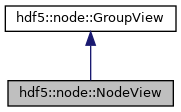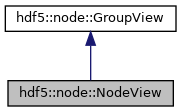hdf5::node::NodeView Class Reference
#include <node_view.hpp>
Inheritance diagram for hdf5::node::NodeView:

Collaboration diagram for hdf5::node::NodeView:

Public Types | |
| using | value_type = Node |
| using | const_iterator = NodeIterator |
Public Member Functions | |
| NodeView ()=delete | |
| NodeView (const NodeView &)=default | |
| NodeView (Group &node) | |
| ~NodeView () override | |
| Node | operator[] (size_t index) const |
| bool | exists (const std::string &name, const property::LinkAccessList &lapl=property::LinkAccessList()) const |
| checks existence of a node More... | |
| Node | operator[] (const std::string &name) const |
| get object by name More... | |
| const_iterator | begin () const |
| const_iterator | end () const |
 Public Member Functions inherited from hdf5::node::GroupView Public Member Functions inherited from hdf5::node::GroupView | |
| GroupView ()=delete | |
| GroupView (const GroupView &)=default | |
| GroupView (Group &parent_group) | |
| constructor More... | |
| virtual | ~GroupView () |
| size_t | size () const |
| get number of links More... | |
| const Group & | group () const noexcept |
| return reference to the parent group More... | |
Member Typedef Documentation
◆ const_iterator
◆ value_type
| using hdf5::node::NodeView::value_type = Node |
Constructor & Destructor Documentation
◆ NodeView() [1/3]
|
delete |
◆ NodeView() [2/3]
|
default |
◆ NodeView() [3/3]
| hdf5::node::NodeView::NodeView | ( | Group & | node | ) |
◆ ~NodeView()
|
override |
Member Function Documentation
◆ begin()
| const_iterator hdf5::node::NodeView::begin | ( | ) | const |
◆ end()
| const_iterator hdf5::node::NodeView::end | ( | ) | const |
◆ exists()
| bool hdf5::node::NodeView::exists | ( | const std::string & | name, |
| const property::LinkAccessList & | lapl = property::LinkAccessList() |
||
| ) | const |
The name must be a valid child name (not a path). This function checks whether a link of a particular name can be resolved into an object.
◆ operator[]() [1/2]
| Node hdf5::node::NodeView::operator[] | ( | const std::string & | name | ) | const |
Here the index is the name of the child node. A name can contain any character but the '.', '..' and '/'. Thus, unlike in the C-API we cannot access object relative to the group a view belongs to but only its direct children. This emphasizes the notion of an associative container which is connected with a gruop.
- Exceptions
-
std::runtime_error in case of a failure
- Parameters
-
name the name of the child to access
- Returns
- instance of Node
◆ operator[]() [2/2]
| Node hdf5::node::NodeView::operator[] | ( | size_t | index | ) | const |
The documentation for this class was generated from the following file:
- /home/jenkins/h5cpp/src/h5cpp/node/node_view.hpp